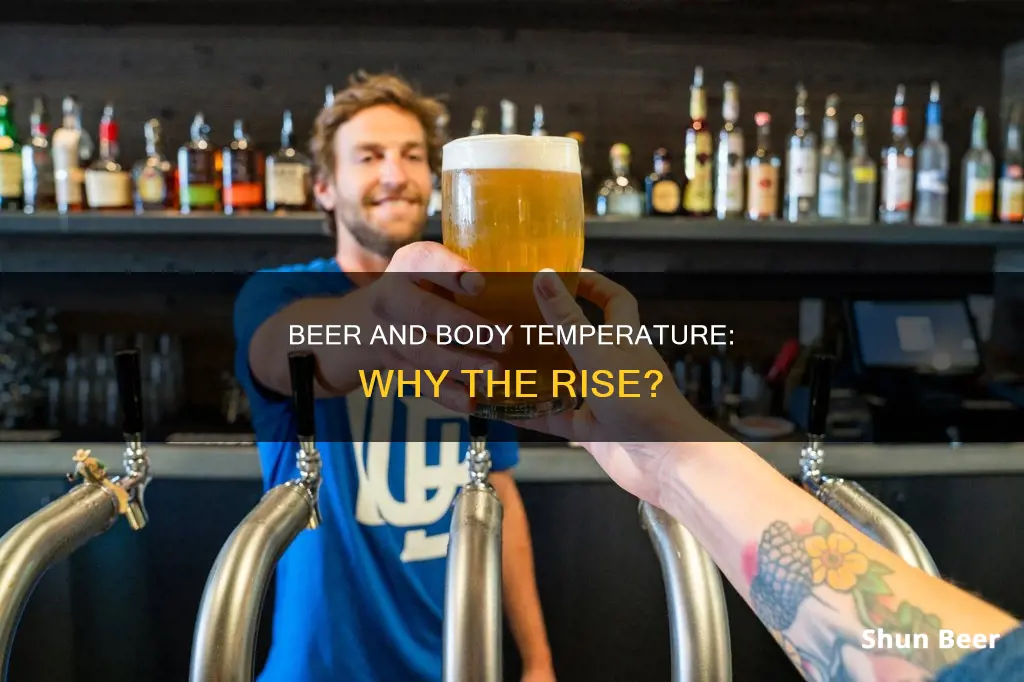
Alcohol influences the thermoregulatory mechanisms that your body uses to either warm up or cool down. While drinking alcohol, your liver is busy digesting it, and the more you drink, the longer it takes for the liver to perform this task. During this time, your liver gives off heat as it works, and blood alcohol levels rise. This makes you feel warmer, but your core body temperature is actually dropping. This is because alcohol widens and relaxes your blood vessels, increasing skin temperature and causing you to sweat.
| Characteristics | Values |
|---|---|
| Does drinking beer raise your body temperature? | No, drinking alcohol creates the illusion of warmth but the body's core temperature does not increase. |
| Why does drinking alcohol make you feel warm? | Alcohol increases blood flow to the skin (vasodilation) and acts as a vasodilator, widening and relaxing your blood vessels. |
| Can drinking alcohol give you a fever? | Alcohol does not cause a fever but it can exacerbate existing conditions that may lead to a fever. For example, it may weaken the immune system, making individuals more susceptible to infections or inflammatory diseases that can manifest with a fever. |
| What is the impact of alcohol on thermoregulation? | Alcohol affects the body's ability to adjust its temperature over the course of a day and inhibits temperature control. |
What You'll Learn

Alcohol lowers body temperature
Drinking alcohol can make you feel warm, but it doesn't raise your body temperature. In fact, it does the opposite: alcohol consumption typically lowers body temperature.
The Illusion of Warmth
When you drink alcohol, it causes your blood vessels to dilate, resulting in a temporary feeling of warmth. This is because alcohol increases blood flow to the skin. However, this is just an illusion, as your body is actually losing heat. This is why people who drink alcohol in cold environments are at risk of hypothermia.
Disrupting Thermoregulation
Alcohol inhibits the body's ability to regulate its core temperature. This is because alcohol affects the mechanisms your body uses to warm up and cool down. For example, alcohol can cause you to sweat, which is a way for the body to lower its temperature through evaporation.
The Science
A study conducted on nine healthy, young men found that alcohol affected their body's ability to adjust its temperature over the course of a day. Seven out of the nine volunteers experienced a loss of body heat at night. Another study on eight healthy men found that alcohol caused their deep body temperature to decrease by 0.3 degrees Celsius compared to when they hadn't been drinking.
Alley Beer Drinking: A Social Norm or Nuisance?
You may want to see also

Alcohol disrupts the body's temperature control
Alcohol does not increase your body temperature; instead, it interferes with the body's ability to regulate its core temperature. This is due to its effects on the thermoregulation mechanisms that the body uses to maintain a stable temperature.
When you drink alcohol, it acts as a vasodilator, widening and relaxing your blood vessels. This leads to increased blood flow to the skin, resulting in flushing, redness, and a feeling of warmth. However, despite feeling warm, your body is actually losing heat. This is because the flushing and sweating deliver more heat to the skin, causing a drop in core body temperature.
Alcohol also impairs the liver's ability to regulate temperature. As the liver digests alcohol, it produces heat. However, high levels of alcohol consumption can overwhelm the liver, leading to a buildup of heat-generating by-products andsection affecting the liver's ability to break down alcohol effectively.
The disruption of thermoregulation caused by alcohol consumption can have dangerous consequences, especially in cold environments. People with high blood alcohol levels may mistakenly believe they are warmer than they actually are, increasing the risk of hypothermia. This risk is furthersection compounded by alcohol's inhibitory effects on cognitive function, which can lead to poor decision-making regarding appropriate clothing or shelter.
Additionally, alcohol can exacerbate existing health conditions or weaken the immune system, making individuals more susceptible to infections or inflammatory diseases that can cause a fever. The diuretic effect of alcohol can also contribute to dehydration, intensifying hangover symptoms and creating sensations similar to fever.
Wildwood Beach: Drinking Beer, What's Allowed?
You may want to see also

Alcohol can cause a fever after drinking
Drinking alcohol can lead to a range of side effects, and one of these is a fever. While alcohol consumption typically lowers body temperature, it can also reduce the body's ability to control its temperature, which, in combination with other factors, could lead to a fever.
The Impact of Alcohol on Body Temperature
Alcohol influences body temperature by impacting an individual's blood vessels and heat regulation. When alcohol is consumed, it causes vasodilation, or the dilation of blood vessels, resulting in a temporary feeling of warmth. This creates the perception of increased body heat but does not directly cause a fever.
Factors Leading to a Fever
There are several factors related to alcohol's impact on the body that can contribute to a feverish feeling:
- Immune System Response: Alcohol can weaken the immune system, making the body more susceptible to infections, which often manifest with a fever.
- Low Blood Sugar: Alcohol disrupts blood sugar levels, leading to fluctuations that can contribute to feelings of weakness and mimic fever-like symptoms.
- Dehydration: Alcohol has a diuretic effect, causing dehydration, which can intensify hangover symptoms and create sensations similar to fever.
- Inflammatory Response: Alcohol triggers inflammation, contributing to headaches, muscle aches, and an overall feeling of discomfort that may be perceived as feverish.
- Exacerbation of Existing Conditions: Alcohol can worsen pre-existing infections or inflammatory diseases, leading to an elevated body temperature.
Recognizing the Signs
It is important to recognize the nuanced factors that contribute to feeling feverish after drinking alcohol. This highlights the importance of moderation, staying hydrated, and being aware of individual health conditions. If you experience persistent discomfort or signs of a fever after heavy drinking, seek medical attention to address any potential underlying problems.
Beer and Buspirone: Is It Safe to Mix?
You may want to see also

Alcohol increases the risk of hypothermia
However, this process of vasodilation means you lose heat, and your core body temperature drops. This is particularly dangerous in cold environments, as the alcohol impairs your cognitive functioning, and you may not realise you are at risk of hypothermia.
A study on the effects of alcohol on thermoregulation found that alcohol consumption lowered the body's core temperature. The study showed that alcohol affected the body's ability to adjust its temperature over a 24-hour period, reducing the range of temperatures the body could regulate. This disruption to the body's natural temperature control can be dangerous, as it increases the risk of hypothermia.
The combination of alcohol and cold weather can be lethal. As your core body temperature drops, your body will try to defend its deep body temperature, and blood flow to the skin will shut down. This can lead to hypothermia, which occurs when your body temperature drops so low that it causes a cardiac arrest.
Therefore, it is important to be aware of the effects of alcohol on your body temperature, especially in cold weather, to avoid the dangerous and potentially fatal consequences of hypothermia.
The Science of Nitro Beers: How Do They Work?
You may want to see also

Alcohol can cause a hangover with fever-like symptoms
The feeling of warmth caused by alcohol is due to the disruption of your body's ability to regulate temperature. Alcohol inhibits your body's control over its core temperature, creating the illusion of warmth. This can be dangerous, especially in cold environments, as it can lead to hypothermia. The impaired cognitive functioning caused by alcohol can further worsen the situation.
While alcohol itself does not cause a fever, it can trigger an immune response similar to an infection, leading to a fever. Heavy drinking can also weaken the immune system, making individuals more prone to infections or inflammatory diseases that may cause a fever. Additionally, alcohol can cause dehydration and low blood sugar, which can contribute to fever-like symptoms.
If you experience a persistent high fever after drinking, especially if it exceeds 104°F (40°C), it is important to seek immediate medical attention. Alcohol can also cause other symptoms, such as tremors, sweating, anxiety, high blood pressure, and heart palpitations. It is crucial to drink responsibly and be aware of the potential health risks associated with alcohol consumption.
Drinking Beer Underwater: Is It Possible?
You may want to see also
Frequently asked questions
No, alcohol consumption does not raise your body temperature. It creates the illusion of warmth by inhibiting the body's control over its core temperature.
Alcohol causes unusual thermoregulation activity by influencing the mechanisms your body uses to either warm up or cool down. It acts as a vasodilator, widening and relaxing your blood vessels, which increases skin temperature and makes you feel warm.
Drinking beer is unlikely to cause a fever directly. However, alcohol can weaken the immune system, making individuals more susceptible to infections or inflammatory diseases that can manifest with a fever.
Yes, alcohol affects the body's ability to regulate temperature. It disrupts the body's regular core body temperature fluctuations throughout the day.
Yes, the combination of alcohol and very cold weather can be dangerous and even lethal. This is because alcohol impairs your cognitive functioning, and you may be under the illusion that your body is warmer than it actually is, which can put you at risk of hypothermia.







